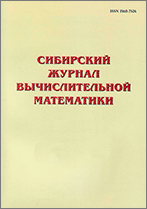|
This article is cited in 1 scientific paper (total in 1 paper)
Mixed methods for optimal control problems
T. Hou
School of Mathematics and Statistics, Beihua University, Jilin 132013, China
Abstract:
In this paper, we investigate a posteriori error estimates of a mixed finite element method for elliptic optimal control problems with an integral constraint. The gradient for our method belongs to the square integrable space instead of the classical $H(\mathrm{div};\Omega)$ space. The state and co-state are approximated by the $P^2_0$-$P_1$ (velocity-pressure) pair, and the control variable is approximated by piecewise constant functions. Using a duality argument method and an energy method, we derive residual a posteriori error estimates for all variables.
Key words:
elliptic equations, optimal control problems, a posteriori error estimates, a mixed finite element method.
Received: 13.09.2017
Revised: 31.01.2018
Citation:
T. Hou, “Mixed methods for optimal control problems”, Sib. Zh. Vychisl. Mat., 21:3 (2018), 333–343; Num. Anal. Appl., 11:3 (2018), 268–277
Linking options:
https://www.mathnet.ru/eng/sjvm687 https://www.mathnet.ru/eng/sjvm/v21/i3/p333
|

| Statistics & downloads: |
| Abstract page: | 124 | | Full-text PDF : | 10 | | References: | 17 | | First page: | 4 |
|




 Contact us:
Contact us: Terms of Use
Terms of Use
 Registration to the website
Registration to the website Logotypes
Logotypes







 Citation in format
Citation in format 
